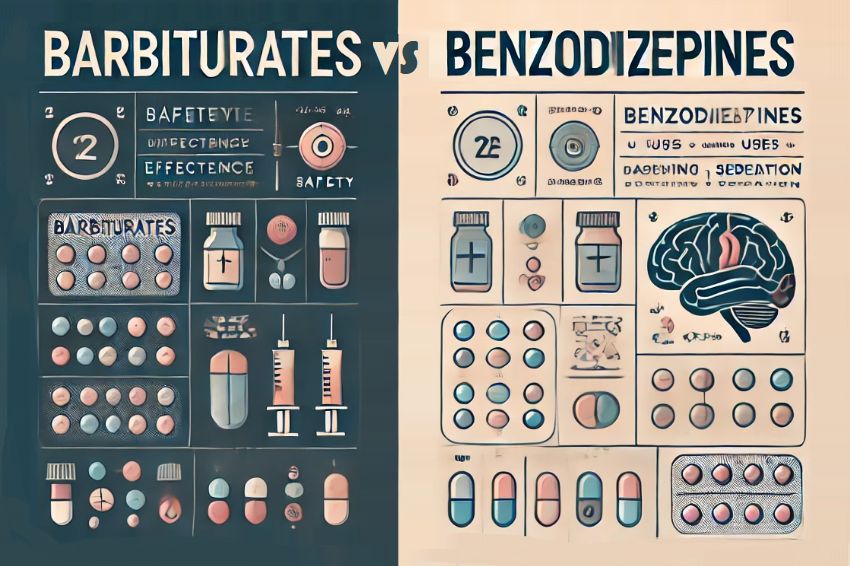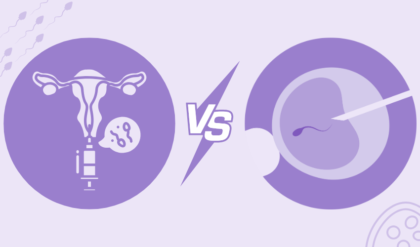Introduction to Barbiturates vs Benzodiazepines
When we discuss to the treatment of anxiety, insomnia, seizures, there are two classes of drugs that are highly implicating and these are Barbiturates and Benzodiazepines. They both have been used in medicine but in different ways in the body. This is important for anyone who may want to undertake any treatment or therapy to understand the differences between barbiturates vs benzodiazepines with their effects and possible side-effects.
Both types of drugs are useful no matter whether you are a person who needs to have some sleepless night, or the one who needs to lessen the intensity of the overwhelming stress. This article shall consider the major differentials of these substances for the cases concerning You!
How They Work in the Body
While they share similar sedative effects they work differently in the brain though their structures are different since the former is a barbiturate and now known as a benzodiazepine. Barbiturates on the other hand are broader in selectivity of GABA receptors this is because they are likely to depress CNS greatly.
Benzodiazepines also act on GABA receptors and increase activity thereof, although, more selectively. They evoke some of their activating effect on GABA in increased yet without causing excessive sedation helps to relieve anxiety.
The difference used is where these substances fit in with neurotransmitters. Barbiturates act on many areas of the brain to cause profound sedation and this has some concern in relation to safety. On the other hand, benzodiazepines are the most usually for treating anxiety since they offer relief without causing remarkable sedation.
Such mechanisms make it possibly understand the rationale for opting for one mechanism as opposed to the other in medical practice and personal use. All have their own different characteristics that determine the impact that they have on feelings and actions.
Barbiturates vs Benzodiazepines: Medical Uses and Indications

Both are different types of drugs which have different uses in medicine. Barbiturates were previously administered because of their hypnotic-sedative effects, for courses in anxiety, insomnia, and seizures. These drugs act quickly and are therefore useful in sick situations but have to be used with caution.
Benzodiazepines are more frequently used nowadays because of the fact that they have a more benign effect profile. It refers to medications used to address different illnesses which include anxiety disorders, panic disorders and even muscle spasms. These drugs can be used by the doctors for a short time after stress or operations which have caused a great deal of stress.
Both classes can also participate in the functioning of anesthesia. Still, the choice between them is specific in individual patient needs and possible adverse effects that may be linked with given drug. However, and that is easily appreciated when trying to select a treatment strategy, it is exigent to discern the precise expressions of the signs.
Barbiturates vs Benzodiazepines: Side Effects and Risks
Barbiturates and benzodiazepines which are used in particular cases have numerous side effects which can be severe.
Possible side effects are likely to be drowsiness, confusion, and dizziness. These symptoms normally affect co-ordination and reasoning ability which may lead to increased perils to the everyday tasks.
More severe reactions can occur as well. Such drugs as barbiturates were found to cause respiratory depression, which results to fatal outcomes when taken in overdosage. Concerning this, benzodiazepines also include the risk, although their safety margin is wider in the right application.
Also, there are issues of cognitive side effects which come with the long-term use of either of the drugs. This is however not a big surprise since memory problems or changes in mood are well known side effects of chronic addiction to the substance.
Hence, anyone must be very careful when taking these drugs. When considering which specific class achieves the greatest therapeutic results, risks against the benefits, one has to take into account each person’s health conditions.
Potential for Dependence and Addiction
When it comes to barbiturates and benzodiazepines one has to mention that dependence and addiction are possible issues. Both these classes of drugs can induce physical dependence, more so where the use has been for a long time.
People found to have taken barbiturates have a very high chance of being dependent on the substance. Following a short period of use, the body becomes tolerant to it which causes the users to start consuming larger quantities of it. This escalation has aggressive implications which have the potential to cause Overdose.
Benzodiazepines are also known to have dependency and they are generally prescribed in a more controlled manner owing to this factor. People may well discover that they require the drug to be just able to lead a normal life, every now and then.
Some of the withdrawal symptoms are completely different in the two cases or occur in different severity levels. When barbiturates are withdrawn, withdrawal signs are generally severe and possibly fatal while benzodiazepines withdrawal symptoms include anxiety, insomnia, or seizures.
These are aspects that any person who contemplates using either of the medications continuously needs to appreciate. Having information enables one to make the right decisions on the actions to take on treatment that may be safer.
Barbiturates vs Benzodiazepines: What’s The Difference?
Barbiturates and benzodiazepines differ significantly in their chemical structure and effects on the central nervous system. Here are the key differences between the two:
| Barbiturates | Benzodiazepines | |
| Mechanism of Action | These drugs facilitate the action of the neurotransmitter GABA and GABA-A receptor thus exerting a CNS depressant effect. They can even prolong the time GABA channel remain open. | These drugs also selectively bind with GABA-A receptor but only increases the frequency of its GABA channel opening Moreover these drugs have more selective and controlled depressant effect. |
| Therapeutic Use | Used in treatment of anxiety, insomnia, and seizure disorder in the past. Their use has decline for these reasons because they have high chances of leading to overdose and drug addiction. | This is used in the treatment of anxiety, insomnia, muscle spasm and seizures. They are most often favored over barbiturates, especially because of a lower incident rate of side effects and toxicity. |
| Safety and Overdose Risk | Short plasma half-life: the drugs toxic effects and the dose necessary to achieve therapeutic results are nearly similar. It makes overdose risk quite high. | Have a broader therapeutic window other than produce more severe toxicity in comparison with barbiturates. Risk of overdose is not ruled out; even more so if used together with other CNS depressants such as alcohol. |
| Addiction and Dependence | Very addictive drug and toxic in high doses with symptoms of withdrawal being severe. | They may also have certain risks of addiction and dependence but the risks are comparatively lower than those associated with barbiturates. Detoxification should be done effectively. |
| Drug Interactions | May cause induction of liver enzymes which metabolize other drugs, which in turn may affect the efficacy of a variety of drugs. | May have additive/synergistic effects with other CNS depressants, such as alcohol, barbiturates, benzodiazepines, opioids, and magnesium. |
Barbiturates vs Benzodiazepines: Choosing Between the Two
Many people prefer benzodiazepines over barbiturates to treat anxiety and sleep disorders mainly because they are less toxic in comparison to barbiturates and are safe when taken under the prescription of a doctor. Each type of drug is somewhat special and contains its advantages and disadvantages. Here is some information to help you understand the differences:
Barbiturates:
- Barbiturates are anxiolytic, hypnotic, and sedative drugs which work by depressing the central nervous system by binding to particular receptors.
- The most common examples include epilepsy, chronic pain, and severe anxiety disorders.
- The barbiturates, however, have a longer action time and are more suitable for the long-term therapies.
- But they are more prone to causing addiction and overdose than benzodiazepines are.
Benzodiazepines:
- Benzodiazepines are known to act on a neurotransmitter known as GABA that has an influence of calming the body.
- Some of them include anxiety, insomnia, seizures, and withdrawal symptoms from the use of alcohol.
- Benzodiazepines on the other hand are faster acting than barbiturates giving quick relief in emergency conditions.
- They are normally classified as having a lower liability for dependency and probability for overdose as compared to barbiturates.
Conclusion: Precautions While Using
Benzodiazepines are reported to be safer than barbiturates because of their larger therapeutic window and low toxicity level in cases of overdose. But they are not safe from dependence and therefore should be taken with caution. Barbiturates are more prone to overdose and addiction and that is why they have been replaced by benzodiazepines and other less hazardous drugs.
Both barbiturates and benzodiazepines are types of medications that should be prescribed and administered with a lot of Caution from their potential hazards including the development of dependence and their interaction with other substances. Patients should ensure they are aware of the consequences of these medicines and frequently discuss with the doctors on the changes to be made.
Considering these factors, both the patients and the health care providers would be in a better position to use the barbiturates and benzodiazepines to ensure the best treatment results with the least complications.





